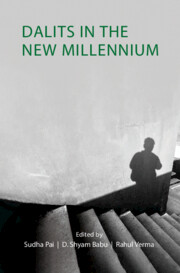Book contents
- Frontmatter
- Contents
- List of Figures
- List of Tables
- Acknowledgements
- 1 Introduction: Dalit Discourse in the New Millennium
- Part I Shifting Patterns of Electoral Politics
- Part II Popular Culture, Discourse, and Protest
- Part III Transformations in Ideology and Identity
- 11 Annihilation, Identity, Representation: Kanshi Ram and the Conundrums of Dalit Political Agency
- 12 Reading Caste and Class Together: A Dalit–Bahujan–Left Alliance?
- 13 Towards Radical Democracy: The Dalit–Bahujan Claim for Political Power
- 14 Liberation Panthers and the Dalit Challenge to Hindutva in Tamil Nadu
- 15 Dalit–Bahujan Politics: Crisis and Future
- Part IV Aspirations and Anxieties
- Part V Discrimination and Representation
- About the Contributors
- Index
11 - Annihilation, Identity, Representation: Kanshi Ram and the Conundrums of Dalit Political Agency
from Part III - Transformations in Ideology and Identity
Published online by Cambridge University Press: 12 July 2023
- Frontmatter
- Contents
- List of Figures
- List of Tables
- Acknowledgements
- 1 Introduction: Dalit Discourse in the New Millennium
- Part I Shifting Patterns of Electoral Politics
- Part II Popular Culture, Discourse, and Protest
- Part III Transformations in Ideology and Identity
- 11 Annihilation, Identity, Representation: Kanshi Ram and the Conundrums of Dalit Political Agency
- 12 Reading Caste and Class Together: A Dalit–Bahujan–Left Alliance?
- 13 Towards Radical Democracy: The Dalit–Bahujan Claim for Political Power
- 14 Liberation Panthers and the Dalit Challenge to Hindutva in Tamil Nadu
- 15 Dalit–Bahujan Politics: Crisis and Future
- Part IV Aspirations and Anxieties
- Part V Discrimination and Representation
- About the Contributors
- Index
Summary
Margins tend to be invisible. They are also generally ‘inaudible’ and are often spoken of by ‘others’ claiming to be their ‘vanguards’. Marginality implies near absence of resources, not only material but also social and political. The twentieth-century revolutionary movements of peasants and the working classes were mostly led by ‘outsiders’, who had the luxury of not being stifled by the oppressive relational structures within which the marginals were themselves located. This has, interestingly, not been the case with India's Dalits, particularly in modern times. Despite the hierarchy of caste being amongst the most vicious forms of inequality, Dalits have produced articulate leaders, a range of political elite from within their own communities. Almost every linguistic region of India has had prominent individuals who led the political struggles of their communities at the regional level and often coordinated with counterparts in other regions and other marginalized caste communities. Some also acquired national and global visibility and eventually became part of India's political elite.
This process, which began during the early decades of the twentieth century, has continued to gain momentum over the years. Foremost among those who emerged from the margins of caste and became recognized as Dalit leaders at the national level is, obviously, B. R. Ambedkar, who also served as a cabinet minister of the first national government in independent India. Kanshi Ram, who founded the Bahujan Samaj Party (BSP) and served as a member of the Indian parliament, was the second to follow in this league. They both had pan-Indian presence and played significant roles in articulating the Dalit political agenda and making Dalit political agency matter in the national imagination. Though they rose to be part of the national political elite, they cultivated a social and political base from where they launched their political lives. Ambedkar, for example, worked mostly from Bombay and, more broadly, Maharashtra, his ‘native’ region. Kanshi Ram had a more fluid trajectory. While his family and zaat-biradari (kinship cluster) lived in Punjab, he emerged as a face of Dalit assertion in all of north India, with significant electoral successes in the state of Uttar Pradesh (UP).
- Type
- Chapter
- Information
- Dalits in the New Millennium , pp. 193 - 209Publisher: Cambridge University PressPrint publication year: 2023



